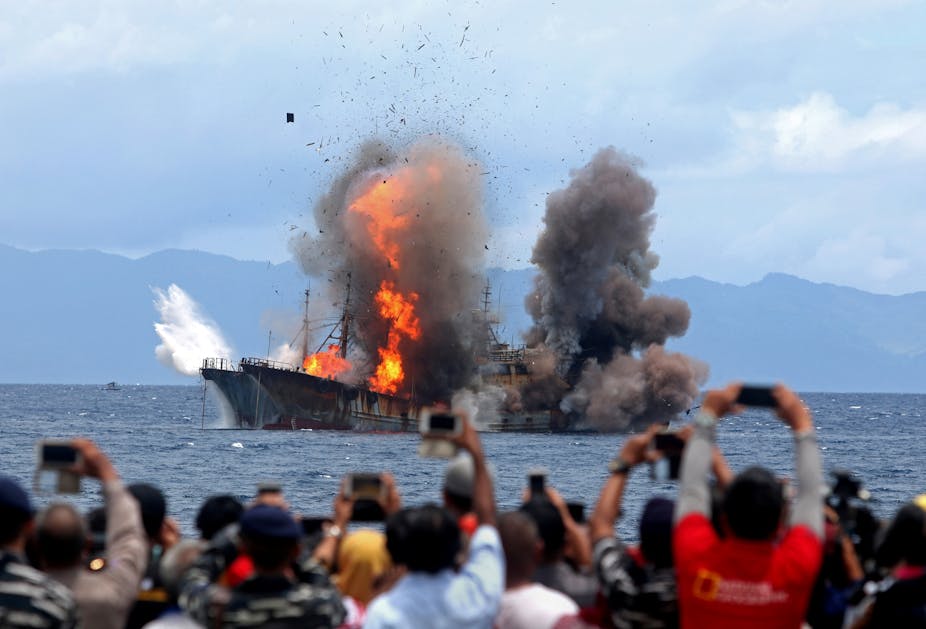Amid the South China Sea dispute and the sinking of foreign fishing vessels, the narratives of nationalism in the national media have strengthened over the past three years.
Illegal fishing occurs in many places in Indonesia’s vast ocean territory, not only in South China Sea. But it has been closely linked to the South China Sea dispute. Some news coverage reporting on illegal fishing during the President Joko “Jokowi” Widodo administration emphasises “our” sovereignty and the future of “our” nation. Several national media outlets — Kompas, The Jakarta Post, Jakarta Globe, CNN Indonesia, and BBC Indonesia — have shown a shift in their coverage of South China Sea disputes.
From law to defence
My recent study found that the South China Sea disputes were initially portrayed in mainstream media as political or law related topics (45.8%). However, in 2016 several incidents occurred on the disputed maritime borders and the dominant media coverage changed to portray the issue as defence related (48.4%).
Another significant change in the media coverage was the increasing reliance on military personnel as sources of information. In the first year, beginning in October 2014, they represented 10.9% of sources which rose to 15.06% in the second year. Former Indonesian Military (TNI) commander Gen. Gatot Nurmantyo was the most dominant source.
On October 29 2017, Maritime Affairs and Fisheries Ministry sank 17 foreign vessels in Indonesian waters. Ten of them were sunk in Natuna waters, a section of Indonesia’s exclusive economic zone which overlaps with the South China Sea. In a news article published by The Jakarta Post, she was quoted saying “the sinking is evidence that we are dedicated to safeguarding our waters for the future of our nation”. On the same day, the minister also highlighted the need for Indonesia to boost its naval defence system in order to protect its waters and sovereignty.
Only days before, The Jakarta Post published an article reflecting on the successes of the ancient kingdom of Sriwijaya. The advertorial was part of the Jalur Rempah (Spice Trade) campaign on Indonesia’s old maritime trade routes. It reminisces about the glorious era for the kingdom and how it maximised the potential of the sea.
Beginning by quoting a common folk song, “Nenek Moyangku Orang Pelaut” (My Ancestors were the Sea People), the author continues to argue that since the demise of Sriwijaya kingdom Indonesia seems to have lost its maritime strength.
Furthermore, The Jakarta Post, a media partner of the Jalur Rempah campaign, connects the Sriwijaya story to the importance of protecting maritime sovereignty. It implies the minister’s tough sinking policy will strengthen Indonesia’s identity as a maritime country.
Nationalism appears more under Jokowi
Nationalism narratives in the mainstream media began to appear more in the first year of Jokowi’s administration. Articles in Kompas widely used words relating to hegemony and maritime colonialism. One such example is opinion piece by senior Kompas journalist Rene Pattiradjawane, “Diplomasi Maritim Konsesi Asia” (Maritime Diplomacy of Asian Concession) published in 2015. The article wrote about gunboat diplomacy and linked the story to maritime colonialism.
Nationalism is, in essence, a consciousness and an expression of belonging to a nation. Narratives of nationalism often operate to challenge colonialism and demand greater international recognition of Indonesia’s power and status.
According to a book entitled Global Media Spectacle: News War over Hong Kong,through the organisation of its coverage, the media can frame the nation as an extension of family . What’s more, family-nation narratives can be woven into media narratives. Ruud Koopmans from Humboldt University of Berlin and Paul Statham from University of Sussex said the framing of “us and them” is also significant as a defence of political sovereignty and as an expression of civic nationalism.
Although foreign vessels from various countries conducted illegal fishing activities, the issue was dominantly presented in the media as a defence issue in relation to China. At this point, China can be considered Indonesia’s biggest security challenger as well as its largest trading partner.
In another case, to mark Indonesia Independence Day in 2016, 60 foreign ships were seized and symbolically sunk. They were sunk at eight different locations. However, the coverage of this celebration was linked to territorial disputes with China. The article stated the Jokowi government’s hard-line stance on combating illegal fishing was part of showing neighbouring countries that Indonesia was in control of its vast territory. In this statement China was singled out as an example.
The nationalistic symbolism behind the Natuna Sea is also evident in the renaming of part of South China Sea into the North Natuna Sea by the Indonesian government in July 2017. Similarly, in 1963 former President Sukarno renamed West New Guinea as Irian and Borneo as Kalimantan, endorsing Indonesian nationalism.
Over the past three years nationalism in the media has risen when covering issues of illegal fishing and the Natuna islands. The issues were often framed in relation to tensions in South China Sea. This nationalistic stance, had manifested itself through government actions against illegal fishing, such as the relocation of fisherman to Natuna.
It is worth considering whether nationalism will have negative implications for regional stability. Obviously so when nationalism reaches a frenetic level, however Indonesia would not want it to affect the country’s reputation as a respected and honest broker in the region.


